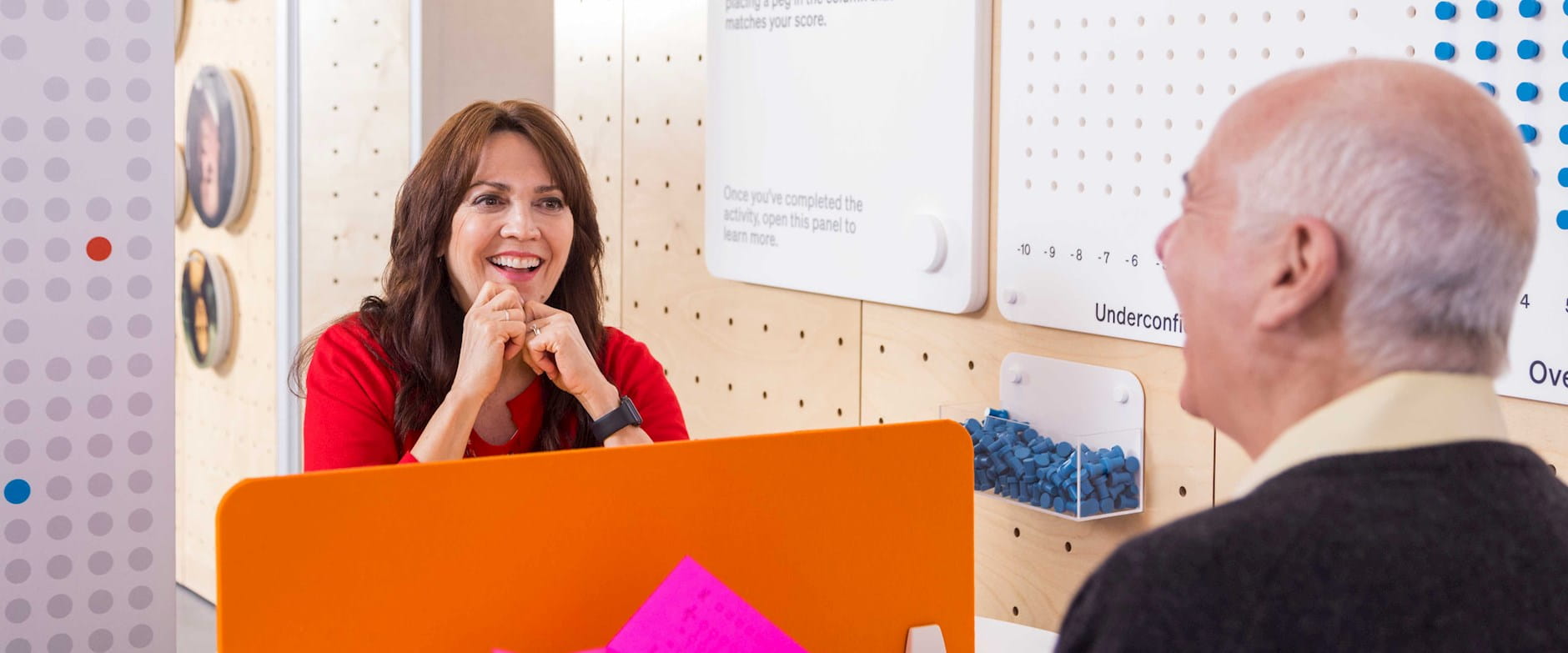
In this exhibit, you’ll play a game with a friend or partner. One person (the responder) marks down how much they enjoy different activities. Then the other person (the guesser) tries to predict the responder’s answers. The format will feel similar to other question-and-answer games, but the results may surprise you.
Images from the Exhibit
When we have a strong impression of someone, it’s easy to mistake general intuition for detailed knowledge about their specific beliefs and preferences. For example, thinking that someone is outdoorsy is not the same as knowing how much they like camping in particular. Settling for “close enough” is often fine, but it can trick us into thinking we have all the right answers.
Schedule Your Visit
Are you ready to visit Mindworks? We look forward to having you.
The Science behind the Experiment
Overconfidence is one of the most pervasive and dangerous biases because it keeps us from knowing our limits, leads us to make rash decisions, and prevents us from recognizing our mistakes.
"Perspective mistaking: Accurately understanding the mind of another requires getting perspective, not taking perspective."
By Tal Eyal, Mary Steffel, and Nicholas Epley.
About the paper: People often assume that taking another person’s perspective will allow them to accurately predict that person’s beliefs, attitudes, and preferences. However, this paper consistently finds that assuming how another person thinks or feels does not reliably lead to accurate predictions about how that person actually thinks or feels. The experiments in this paper demonstrate this finding in multiple domains, such as predicting another person’s emotions from facial expressions and body postures, predicting fake versus genuine smiles, predicting when a person is lying or telling the truth, and predicting a spouse’s preferred activities and consumer attitudes. Yet, people felt confident that assuming another person’s perspective would make them more accurate. The authors find that directly asking people for their perspective is much more effective for understanding how they think and feel. Finally, increasing interpersonal accuracy seems to require gaining new information rather than relying on existing knowledge about another person.
"Overconfidence: It depends on how, what, and whom you ask."
by Joshua Klayman, Jack B. Soll, Claudia González-Vallejo, and Sema Barlas
About the paper: This paper finds that people tend to be overly confident that their predictions are correct. Though this question has been explored by prior research, these authors introduce a novel methodology to test the robustness of this finding. They also explore when people are most likely to be overconfident. They find that some domains are more susceptible to overconfidence than others, but this is a function of how difficult it is to determine how competent one is in that domain and how many potential correct answers there are. Interestingly, the difficulty of the domain does not seem to have an effect on overconfidence. Finally, they find that people who have limited access to contradicting information are the most susceptible to overconfidence. Taken together, this paper suggests that overconfidence is most likely when questions are more ambiguous or when people have limited information.
"Easier seen than done: Merely watching others perform can foster an illusion of skill acquisition."
by Michael Kardas & Ed O'Brien
About the paper: Modern technologies like YouTube offer unprecedented access to skilled performances by other people. These experiments reveal that repeatedly watching others can foster an illusion that the viewer has acquired that skill (without actually practicing themselves). However, people’s actual abilities—from throwing darts and doing the moonwalk to playing an online game—do not improve after merely watching others. What do viewers see that makes them think they are honing a new skill? Extensive viewing allows people to track what steps to take but not how those steps feel when taking them. Accordingly, experiencing a “taste” of performing reduces the illusion: Watching others juggle makes it seem easy, but holding the pins yourself mitigates the perceived change in your own ability.
"Overconfidence vs. market efficiency in the National Football League."
by Cade Massey & Richard Thaler
About the paper: Much of economic research has assumed that prices reflect market value, meaning that people will only pay as much as something is worth. However, research in psychology suggests that people are systematically biased in how they perceive worth. The authors in this study analyzed data from the National Football League, looking at draft-day trades, player performance and compensation. They find that top draft picks are consistently overvalued, meaning that decision-makers are willing to pay more for a top draft pick than the top drafted players are actually worth, in terms of performance.
"The Overconfidence Problem in Forecasting" in the New York Times
by Richard Thaler
Explore More Mindworks Exhibits
Share This Page
Tell your friends and family about this Mindworks exhibit on social media.









